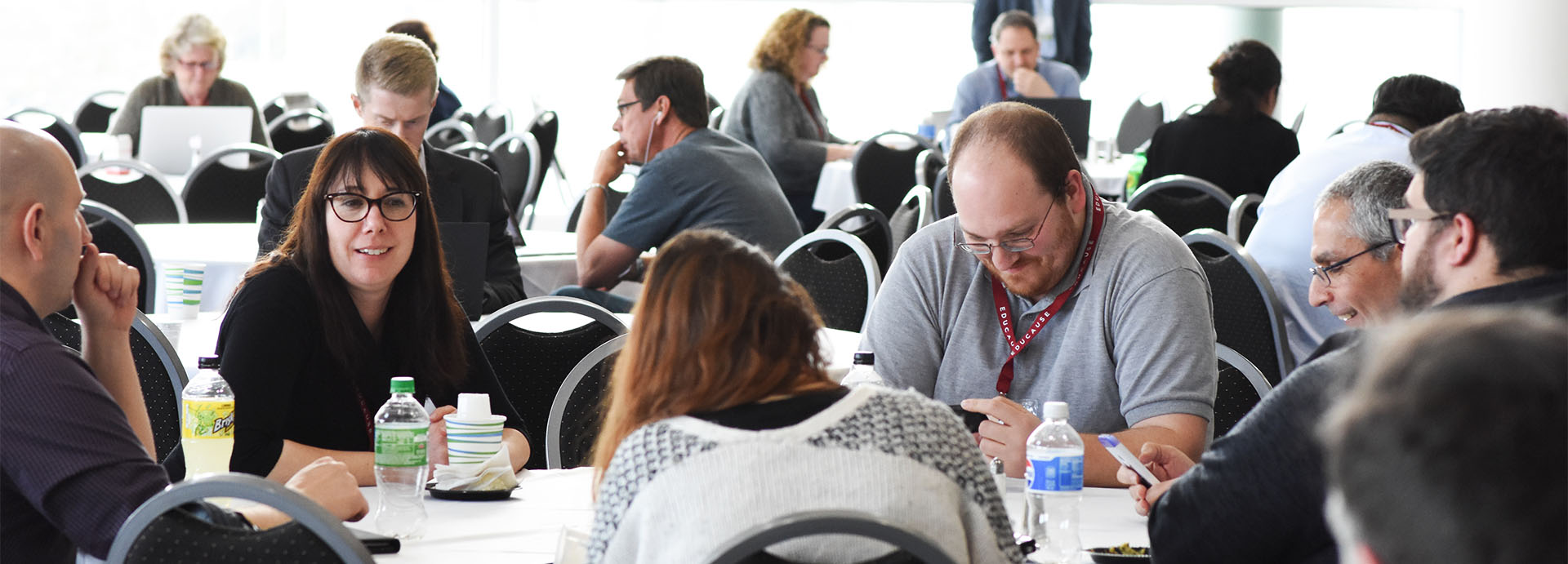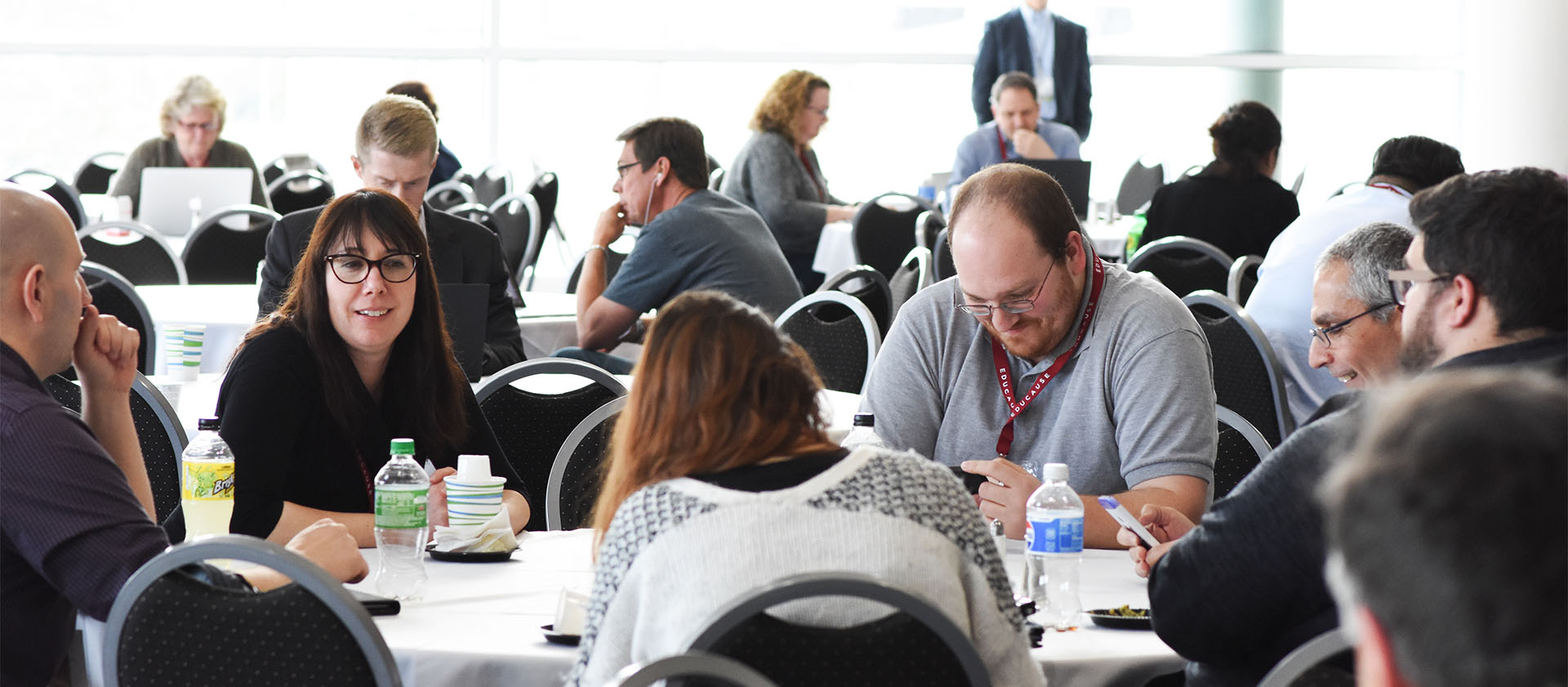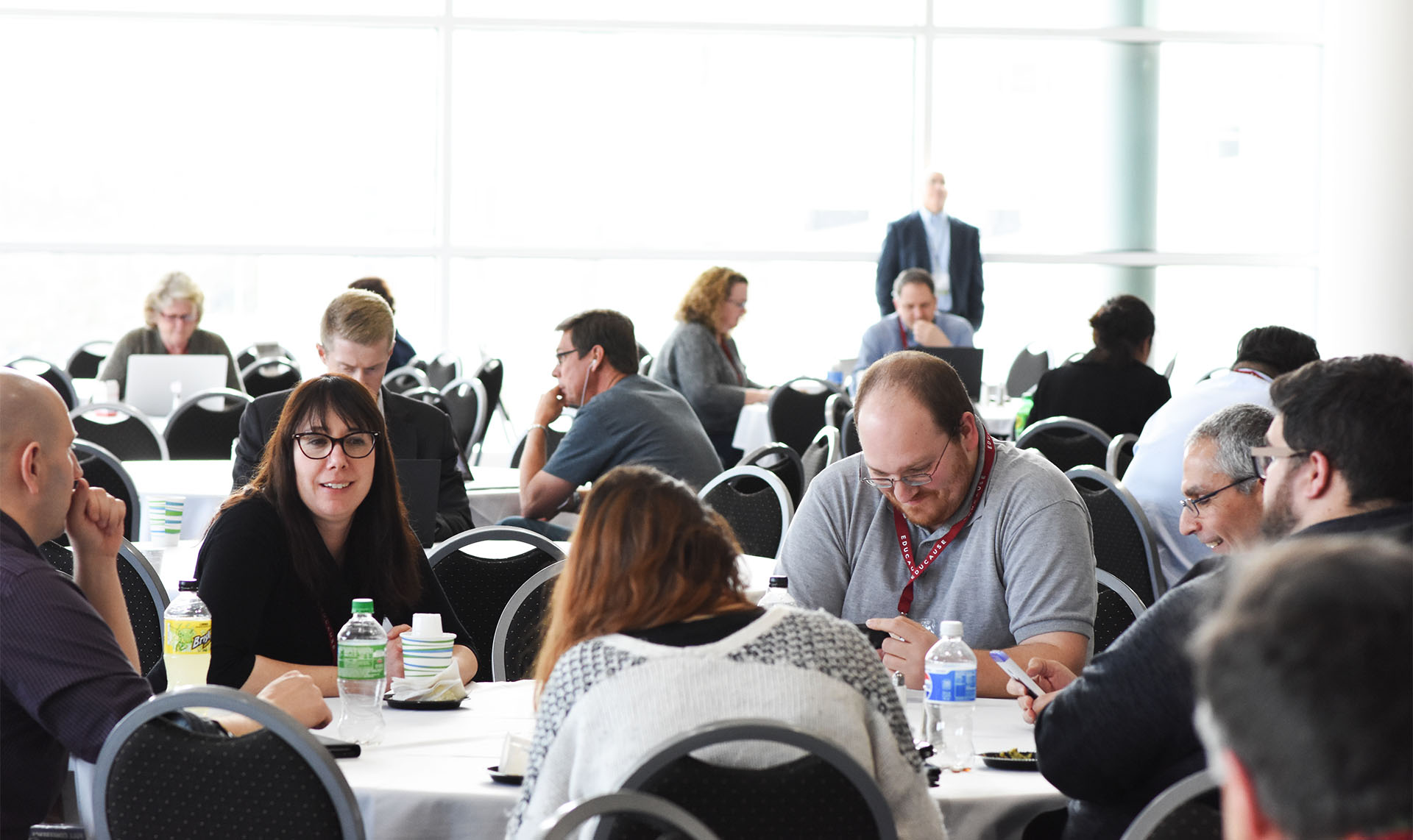- Overview
- Agenda
- Speakers
- Lodging
- Parking Instructions
- Slides/Handouts
Virtual Reality and 3D technologies for the Arts and Humanities Classroom
Where:University of Massachusetts-Amherst
Campus Center
First Floor Campus Center Way
Amherst, MA
Directions and Campus Map
When: Tuesday, May 23, 2017
9:00 am - 3:00 pm
Note: Registration starts at 7:30am
Workshop Organizer: Randall Rode, Yale University
Registration Fee:
NERCOMP Member: $145
Non Member: $290
Event Overview
Virtual reality and 3D technologies are no longer confined to a rarefied world of expensive hardware or complex software requiring an engineering or computer science background. Free web-based and mobile app software paired with cheap hardware like Google Cardboard and services such as Shapeways.com bring these technologies into everyone’s reach. Potential clients include students and faculty in the arts and humanities who can use these tools to look at their worlds and disciplines in new ways. In this workshop, we will explore how these technologies can be used, and discuss ideas for classroom applications and lesson plans. Participants will also have the opportunity to play with some of these technologies.
Bring a smart phone, tablet, laptop or all three for the hands-on segments as well as a small object to scan. No prior experience with 3D or virtual reality design required.
Session Outcomes:
- See examples of how 3D technologies are being used in the arts and humanities classroom, and start to develop ideas on how to apply these technologies to your own work
- Work with free and open source 3D/virtual reality tools to create and manipulate objects to better understand the possibilities of these technologies.|
- Gain an understanding of the current state of the 3D/virtual reality landscape, and how to stay abreast of ongoing developments.
Registration Cancellation Policy:
By clicking on the "Register Now" button, you are indicating a commitment to attend and will be held responsible for the registration fee. Your fee can be refunded if you notify us of a cancellation at least 8 days prior to the event via email to nercomp@nercomp.org.
Event Disclaimer:
NERCOMP reserves the right to use any photographs or other mechanical recordings taken at NERCOMP events in promotional materials. No mechanical recordings of any kind may be used at NERCOMP events without the prior written consent of NERCOMP organizers and presenters. The views and opinions expressed at NERCOMP events do not necessarily reflect those of NERCOMP, nor does NERCOMP make any representation regarding the information presented at NERCOMP events.
7:30am - 9:00am Coffee & Registration
9:00am - 9:15am Introductions
9:15am - 10:00am Seeing the World in New Ways
Speaker: Justin Berry, Critic, Yale School of Art
The way that we see the world around us ultimately changes the world that we see. By looking at a number of older technologies that have shaped our vision, and some of the historical events taking place around the time of their invention, such as perspective and photography, we can start to better understand what emerging 3D technologies mean to us now, as well as what their wide adoption might lead to in the future.
10:00am - 10:30am Activity #1 and morning break
Throughout the day participants will work through a series of hands-on experiences with simple 3D scanning, design and fabrications tools. These are all simple, freely available tools, which do not require a lot of technical preparation. And are representative of the types of tools that can be incorporated into classroom activities and assignments.
10:30am – 11:15am Note from the Field – Architects, Dante, Handsome Dan and the application of 3D
Speaker: John Eberhart, Licensed Architect and Critic, Yale School of Architecture
He will talk about the use of scanning and 3D printing in the classroom. How we integrate it into our curriculum and how students have responded to the technology. Finally, who this technology was position to shift from just a representation tool to a tool that allows students to explore design iterations.
11:15am – 12:00pm Activity #2: Finding, creating and producing 3D objects, part 1
Throughout the day participants will work through a series of hands-on experiences with simple 3D scanning, design and fabrications tools. These are all simple, freely available tools, which do not require a lot of technical preparation. And are representative of the types of tools that can be incorporated into classroom activities and assignments.
12:00pm – 1:00pm Lunch
1:00pm – 1:45pm Experiences in the Classroom
Speakers: Marta Figlerowicz, Assistant Professor of Comparative Literature and English, Yale University
Ayesha Ramachandran, Assistant Professor of Comparative Literature, Yale University
Can Blended Reality be useful in a humanities classroom? This spring, we introduced these technologies in an upper-level undergraduate seminar to help our students think more creatively and critically about the notion of the self; they provided fascinating, frequently unexpected bridges between our students' own life experience and the diverse historical sources through which we encouraged them to think about themselves.
1:45pm – 2:30pm Putting It into Practice – Building lesson plans and classroom activities
Speaker: Randall Rode, Director of Campus IT Partner Relationship and Development; Lecturer School of Drama, Yale Univerrsity
This session is a facilitated dialog with the workshop participants and speakers to draw on experiences of participants, and the expertise of the presenters to summarize the day's presentations, identify best practices for use of 3D technologies in the classroom, and establish next steps to preparing faculty and support staff for utilizing these technologies in the classroom.
2:30pm – 3:00pm Activity #3: Playing with 3D, part 2
Throughout the day participants will work through a series of hands-on experiences with simple 3D scanning, design and fabrications tools. These are all simple, freely available tools, which do not require a lot of technical preparation. And are representative of the types of tools that can be incorporated into classroom activities and assignments.
3:00pm End
Justin Berry
Justin Berry is a recipient of the 2014 NYFA artist’s fellowship. His work has been exhibited internationally in various venues, with work recently on view at Essex Flowers in New York, CAVE in Detroit, CUAC in Salt Lake City, and at the University of Richmond Art Museum. Recent issues of Frieze, Pin-up magazine, Media-N, and Prattfolio included features on his work and Bomb Magazine commissioned the piece i-would.com from him as part of their portfolio series in 2013. Currently he is a member of the gallery collective Essex Flowers based in New York, and from 2007 to 2008 he was co-director of the artist run curatorial space Alogon, in Chicago, IL. He holds an MFA from the Art Institute of Chicago.
John Eberhart
John Eberhart is a licensed architect and critic at the Yale School of Architecture. His research focuses on surface, parametric, and building information modeling (BIM) as it relates to fabrication, visualization, and rapid prototyping. His interests lie at the intersection of the digital and the physical – as it relates to creating and making. Mr. Eberhart’s teaching specialties include 3D modeling, 3D printing, 3D scanning, fabrication, rapid prototyping, robotics, Arduinos, and visualization technologies.
As the Director of Digital Media, Mr. Eberhart oversees the technology needs of the school including workstations, laser cutting, desktop and wide-format printing, 3D printing, servers and infrastructure, and the fabrication facilities. He also evaluates emerging technologies and is responsible for integrating this technology into the curriculum and teaching mission of the school. Within the School of Architecture, Mr. Eberhart is an area coordinator for the design and representation study area and serves on the School’s curriculum committee. At the University level, Mr. Eberhart chairs a number of university-wide committees that focus on the arts and technology areas.
Mr. Eberhart maintains an architectural firm in Woodbridge Connecticut, specializing in residential and light commercial work. In addition, the firm operates a fabrication facility designing and fabricating building components as well as custom cabinetry. Mr. Eberhart is also a design collaborator for C-Studio located in New Haven Connecticut, designing large scale office and residential buildings across Latin America. He has worked at a number of design firms, including the offices of Beeby Rupert and Ainge Architects in Chicago and Pickard-Chilton Architects in New Haven. Mr. Eberhart has a bachelor’s of Arts and Science in Architecture from the Ohio State University and a Masters in Architecture from Yale University.
Marta Figlerowicz
Marta Figlerowicz is Assistant Professor of Comparative Literature and English, and an affiliate of the Film and Media Program, at Yale University. She is the author of two books, Flat Protagonists (2016) and Spaces of Feeling (2017, forthcoming), and is currently drafting a third project about the phenomenology of our rapidly developing digital environments. Work related to this new project has appeared or is forthcoming in academic journals such as Poetics Today, Room One Thousand, and Camera Obscura, as well as in more popular venues including Jacobin, Logic, Cabinet, n+1, and The Los Angeles Review of Books. Figlerowicz is also a principal coordinator of “Internet Cultures,” and “Utopia after Utopia,” two Yale research initiatives that take a more global view of the political and aesthetic impact of contemporary media. The course she co-developed with Ayesha Ramachandran, which will be discussed during this NERCOMP workshop, introduces some of these topics and questions into undergraduate teaching.
Ayesha Ramachandran
Ayesha Ramachandran is Assistant Professor of Comparative Literature and an affiliate of the Program in Renaissance Studies. A literary and cultural historian of early modern Europe, she pursues interdisciplinary research on literature, philosophy, cartography, visual culture and the history of science, focusing on the long histories of globalization and modernity. Her prizewinning first book, The Worldmakers(University of Chicago Press, 2015) provides a cultural and intellectual history of “the world,” showing how it emerged as a cultural keyword in the west. With a recently awarded Mellon New Directions Fellowship (2016), she hopes to expand this work and pursue research on cross-cultural contacts between Europe and the Indo-Islamic world in the early modern period; as a preliminary step, she is currently co-organizing a series of workshops on Early Modern Techne that aim to initiate cross-cultural dialogues on material culture across the arts and sciences that develop her interest in the long, entwined histories of the “two cultures.” Her new book manuscript in progress tentatively entitled, On Lyric Thinking considers the cognitive possibilities of poetry and its role in the shaping of the self as a moral subject. Her undergraduate teaching emphasizes the intersections between humanistic and scientific thinking and their socio-cultural force.
Randall Rode
Hotel Information:
Rooms are available at the Hotel UMass, located on the campus of University of Massachussetts-Amherst.
To make reservations contact Hotel UMass at 877-822-2110 and request the "NERCOMP Room Block" or Group Code NOM17C.
The room block for May 22nd will be available until 5:00pm on April 24th, 2017. Guest rooms are available for $130 per night.
The Campus Center Parking Garage will be closed on May 23, 2017.
Parking will be at outside parking lots 25 and 12 (near the Mullins Center). Shuttle buses will run from these locations from 7:30am–9:30am and 2:30pm–3:30pm. It is also a short walk to the Campus Center.
Please see the marked up map at this link that has the parking lots identified. The purple triangle is the bus stop location.
You can also view the Campus Map.
Please plan to arrive 20-30 minutes early to allow time to walk to the Campus Center or catch the shuttle.
Handicap Parking:
Guests with a handicap parking permit can park in any spots closest to the Campus Center (even if the spot is not a designated handicap spot – parking services is allowing them to park anywhere). The closest spots are right outside the Student Union, or outside the northern entrance of the building, next to Hasbrouck Lab. Please see attached map.
Also, here is a link to an interactive parking map - https://umts.github.io/ParkingMap/
If you click on “Parking Options” on the right hand side and check Handicap parking, this will also show all of the accessible spots on campus.
Presentations, Slides and Handouts:
1. Representing the Self in the Digital Age, Marta Figlerowicz & Ayesha Ramachandran, Yale University
2. 3D Modeling, Justin Berry, Yale University





